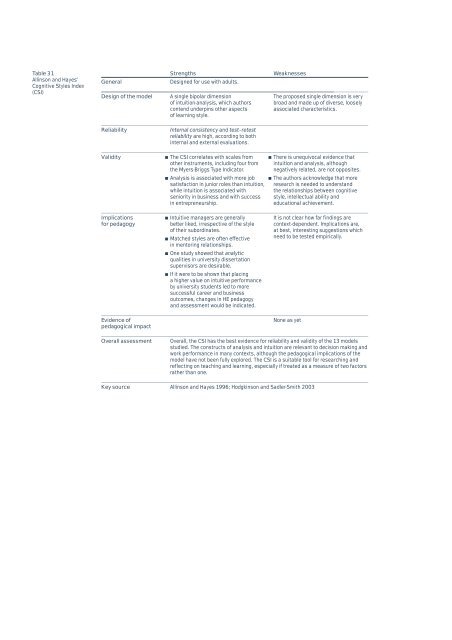learning-styles
learning-styles
learning-styles
You also want an ePaper? Increase the reach of your titles
YUMPU automatically turns print PDFs into web optimized ePapers that Google loves.
Table 31<br />
Allinson and Hayes’<br />
Cognitive Styles Index<br />
(CSI)<br />
General<br />
Design of the model<br />
Strengths<br />
Designed for use with adults.<br />
A single bipolar dimension<br />
of intuition-analysis, which authors<br />
contend underpins other aspects<br />
of <strong>learning</strong> style.<br />
Weaknesses<br />
The proposed single dimension is very<br />
broad and made up of diverse, loosely<br />
associated characteristics.<br />
Reliability<br />
Internal consistency and test–retest<br />
reliability are high, according to both<br />
internal and external evaluations.<br />
Validity<br />
The CSI correlates with scales from<br />
other instruments, including four from<br />
the Myers-Briggs Type Indicator.<br />
Analysis is associated with more job<br />
satisfaction in junior roles than intuition,<br />
while intuition is associated with<br />
seniority in business and with success<br />
in entrepreneurship.<br />
There is unequivocal evidence that<br />
intuition and analysis, although<br />
negatively related, are not opposites.<br />
The authors acknowledge that more<br />
research is needed to understand<br />
the relationships between cognitive<br />
style, intellectual ability and<br />
educational achievement.<br />
Implications<br />
for pedagogy<br />
Intuitive managers are generally<br />
better liked, irrespective of the style<br />
of their subordinates.<br />
Matched <strong>styles</strong> are often effective<br />
in mentoring relationships.<br />
One study showed that analytic<br />
qualities in university dissertation<br />
supervisors are desirable.<br />
If it were to be shown that placing<br />
a higher value on intuitive performance<br />
by university students led to more<br />
successful career and business<br />
outcomes, changes in HE pedagogy<br />
and assessment would be indicated.<br />
It is not clear how far findings are<br />
context-dependent. Implications are,<br />
at best, interesting suggestions which<br />
need to be tested empirically.<br />
Evidence of<br />
pedagogical impact<br />
None as yet<br />
Overall assessment<br />
Key source<br />
Overall, the CSI has the best evidence for reliability and validity of the 13 models<br />
studied. The constructs of analysis and intuition are relevant to decision making and<br />
work performance in many contexts, although the pedagogical implications of the<br />
model have not been fully explored. The CSI is a suitable tool for researching and<br />
reflecting on teaching and <strong>learning</strong>, especially if treated as a measure of two factors<br />
rather than one.<br />
Allinson and Hayes 1996; Hodgkinson and Sadler-Smith 2003


